FOULED RESOURCE
Official reports reveal massive scale of the waste, pollution and poorly treated water crisis
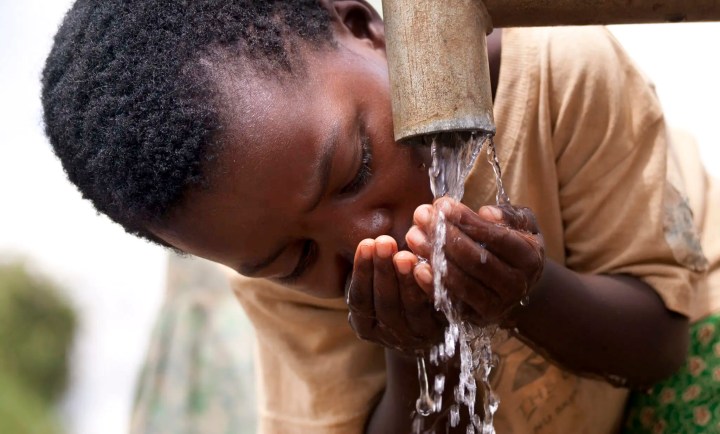
Three separate audit reports have laid bare how one of the country’s most precious resources is being fouled by sewage and other effluents, wasted through pipe leakages or non-payment and, in several areas, not treated to safe drinking standards.
The good news is that tap water in most of South Africa’s big cities is still rated as “safe” to drink (albeit declining) – but the same cannot be said for municipal water supplies in large swathes of the country.
According to the latest Blue Drop report published on Tuesday, 5 December, “it was not microbiologically safe to drink the water in almost half (46%) of our drinking water systems at times during 2022 when the Blue Drop audit was done” – increasing the risk of life-threatening water-borne diseases such as cholera and chronic diarrhoea.
On a national basis, close to half (47%) of municipal tap water is now classified as non-revenue water (NRW) due to leaking pipes, wonky or non-existent water meters, illegal connections and poor billing and revenue collection – way above the international average of 30% for non-revenue water.
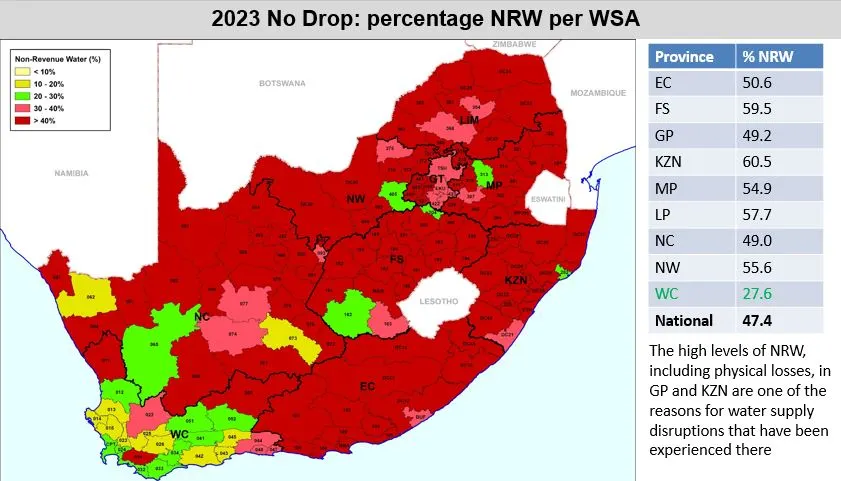
(Image: Supplied)
In some cities, the waste or non-payment rate is much higher – with no funds recovered for 58% of the water currently supplied to eThekwini.
At a provincial level, KwaZulu-Natal has the highest rate of non-revenue water waste (60.5%), followed by the Free State (59.5%), Limpopo (nearly 58%) – while the Western Cape had the lowest rate (about 27%).
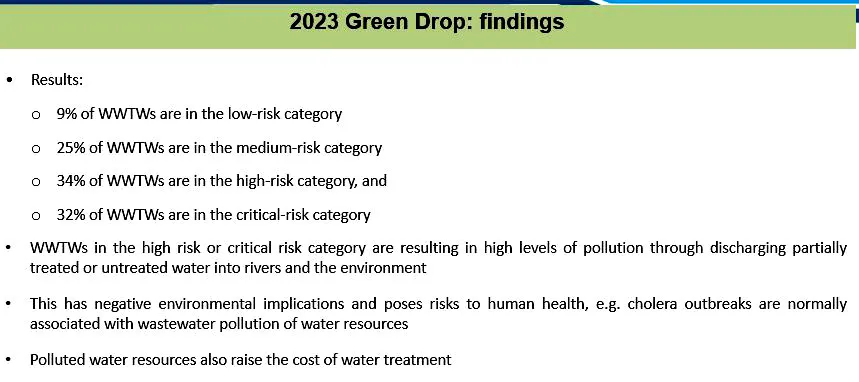
(Image: Supplied)
Nearly two-thirds (64%) of the country’s sewage and wastewater treatment works are also at “high or critical risk” of discharging partially treated or untreated water into rivers and the environment.
The three reports (Blue Drop, No Drop and the Green Drop progress report) were published on Tuesday by Water and Sanitation Minister Senzo Mchunu, who acknowledged the need for “fundamental reform” to arrest the decline in municipal water and sanitation services.
To his credit, Mchunu resuscitated the three water auditing schemes last year after they were dumped by former water minister Nomvula Mokonyane in 2014 to avoid political embarrassment.
Significantly, the latest Blue Drop report includes a prominent quote from the American writer and philosopher, Elbert Hubbard, who proclaimed: “The final proof of greatness lies in being able to endure criticism without resentment.”
Lamenting the poor results, the director-general of the Department of Water and Sanitation (DWS), Dr Sean Phillips, further acknowledged and spelt out some of the more obvious consequences of scarce water supplies going down the drain, during a formal presentation at Emperor’s Palace in Johannesburg.
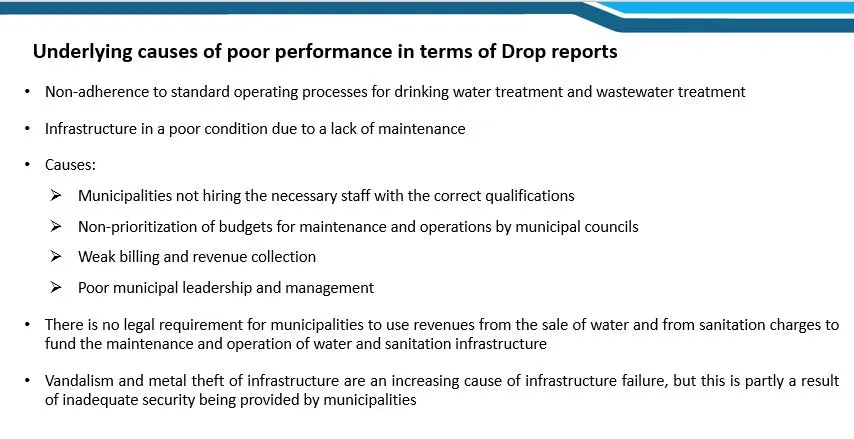
(Image: Supplied)
“Why is non-revenue water a problem?” he asked, somewhat rhetorically.
“A huge amount of money has to be spent to develop dams to capture and store water. This money is wasted if that water is thrown away through leaks.
“Municipalities buy treated water from water boards. If municipalities do not get revenue from that water, then they cannot pay the water boards. If water boards don’t get paid, they can’t treat water any more… If municipalities don’t collect the revenue they are supposed to collect, then they cannot afford to maintain and operate the infrastructure.
“South Africa is a water-scarce country and every drop counts. We cannot afford to throw treated water away through leaks,” Phillips said.
And yet, the No Drop report suggests that about 45% of municipalities still cannot provide basic information such as monthly consumption figures.
“In some cases, municipalities are unwilling to provide the information as it reflects badly on them…”
To address this, the new No Drop report recommends that: “DWS should consider strengthening regulations (not policy) whereby water services institutions are compelled to either measure and control or fix leaks on private properties, as government cannot continue to fund new infrastructure projects to supplement leakage.”
The department’s 2018 National Water and Sanitation Master Plan further states that: “South Africa is facing a water crisis caused by insufficient water infrastructure maintenance and investment, recurrent droughts driven by climatic variation, inequities in access to water and sanitation, environmental degradation and resource pollution, and a lack of skilled water engineers.
“This crisis is already having significant impacts on economic growth and the well-being of everyone in South Africa.
“However, despite all the support being provided to municipalities, the Drop reports indicate that water services continue to decline and that fundamental reform is required to arrest and turn around the decline in municipal water and sanitation services.”
Turning to the results of the 2023 Blue Drop drinking water quality findings, Mchunu’s department acknowledges that the South African Bureau of Standards states that it is not safe to drink water if less than 97% of tests for microbiological contaminants and chemical compliance conducted over a year comply with water quality standards.
“It was therefore not microbiologically safe to drink the water in almost half (46%) of our drinking water systems at times during 2022 when the Blue Drop audit was done, which resulted in increased risk of life-threatening water-borne diseases such as cholera and chronic diarrhoea.”
Of the 151 water service authorities and water boards assessed last year, it was found that 3% of the sampled systems were in a “critical infrastructural condition”; 12% in a poor infrastructural condition; 49% in an average infrastructural condition; 31% in good condition, and only 5% in an excellent condition.
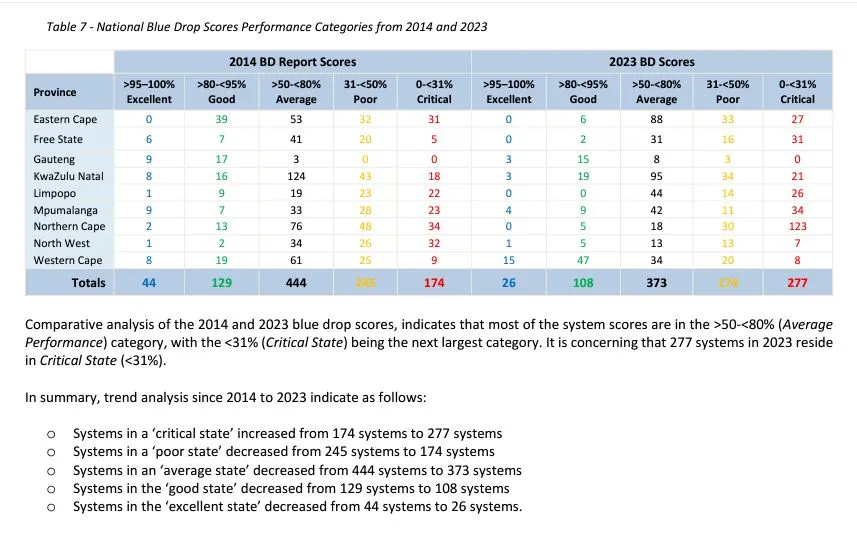
(Image: Supplied)
Overall, just 26 water providers managed to secure Blue Drop certificates this year, compared to nearly double that number almost a decade ago when Mokonyane pulled the plug on the national audit scheme.
At a provincial level, the Western Cape scooped 15 Blue Drop certificates – compared to just three certificates each for Gauteng and KwaZulu-Natal, with the Eastern Cape securing not one.
These certificates are only awarded to water providers that score above 95%.
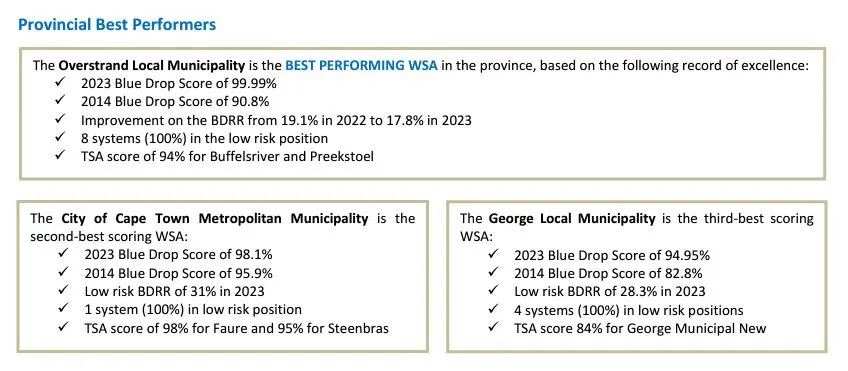
(Image: Supplied)
Two of the highest performers were the City of Cape Town (98%) and the Overstrand Local Municipality (99.99%).
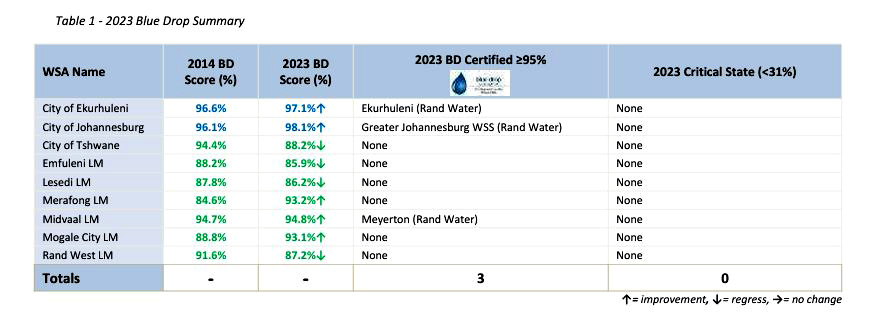
(Image: Supplied)
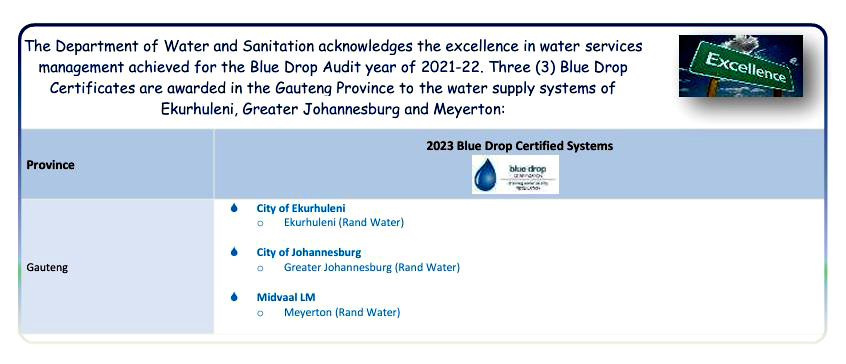
(Image: Supplied)
Johannesburg and Ekurhuleni (both supplied by Rand Water) scored 98% and 97%, while Tshwane (Pretoria) only managed a Blue Drop score of 88% (down from 94% in 2014).
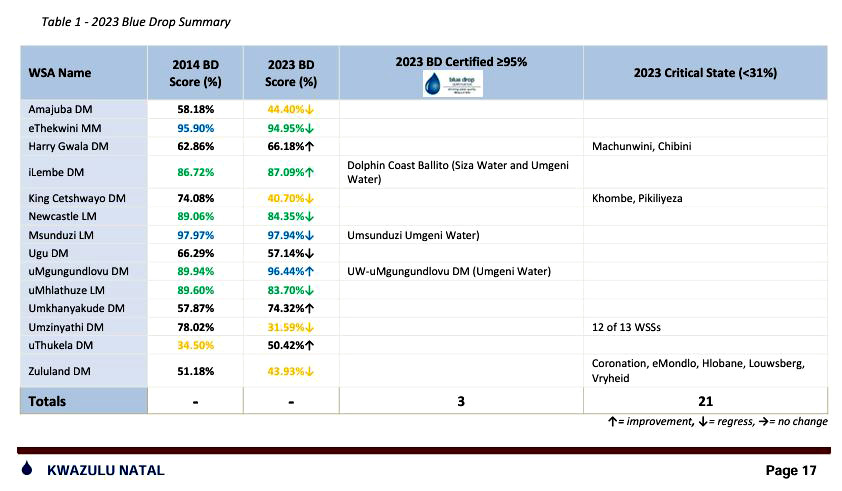
(Image: Supplied)
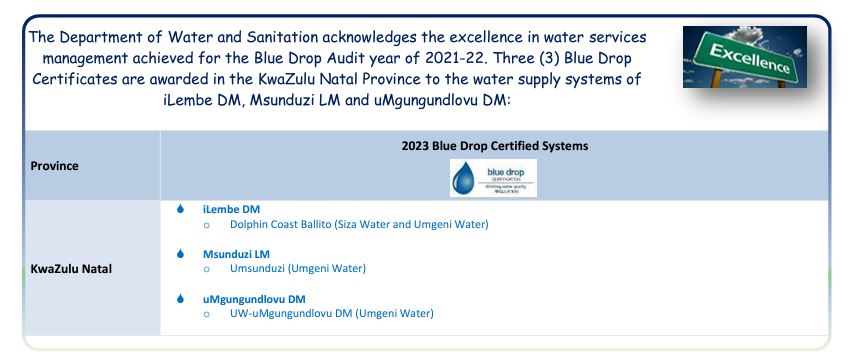
(Image: Supplied)
In KwaZulu-Natal, only three water authorities (all supplied by uMngeni-uThukela Water) were awarded certification – including Pietermaritzburg (98%).
The eThekwini municipality – which receives 98% of its treated tap water from uMngeni-uTzhukela Water – just missed out, with a score of 94.95%.
Not a single Blue Drop certificate was awarded to the Eastern Cape, with Gqeberha (Port Elizabeth) scoring 85% and East London (83%).
Overall, the national department said, there had been a “severe regression” in drinking water quality between 2014 and 2023, although “drinking water quality is generally good in the major metropolitan areas”.
“When the tests carried out by a municipality indicate that drinking water poses a health risk, the municipality is obliged by law to inform its consumers that the quality of the water that it is supplying poses a health risk.
“DWS has sent non-compliance letters to the municipalities with systems which scored poorly or badly in terms of drinking water quality in the 2023 Blue Drop report. These letters require the municipalities to inform their residents should they still have poor or bad compliance.
“The public can safely consume water from their taps if their municipalities indicate that the water being provided is being tested and meets the legal requirements – residents should check with their municipalities if this is the case.
“The department provides monthly water quality data received from municipalities on its Integrated Regulatory Information System webpage that can be accessed at ws.dws.gov.za/iris/mywater.aspx.”
All three of the national and provincial Drop reports can be accessed here. DM





















Therer’s a saying in Afrikaans, “Daar’s ‘n drol in die drinkwater” it rings a very true bell in this case and no imagination required to know why.
And we all know who the drol is. Idiots.
xxx
How low the ANC has taken us. The report shows what is needed is known, but there is no competent capable strucuture and management to implement. They cannot even organise to stop water pipe leaks. Elections become irrelevent. We need plumbers not President’s and greedy self centeted politicians.
This is a human rights issue and those in charge of the collapse of our water systems must be criminally prosecuted. And as for Mashatile swaggering around the country telling everyone that SA is better today than 30 years ago – it may well be, but it’s not better than it was was 15 years ago before Zuma and then Ramaphosa and their evil regimes destroyed our country. Objectively, anyone who says it is, is a liar.
You reap what you sow! Another demonstration of ANC leadership incompetence, largely fuelled by nepotism and corruption!
Reality check; this putrid ANC Govt has destroyed every single thing they have touched…ESKOM, SAA, PORTNET TRANSNET, SAPS, …one hell of a list and now WATER.
Every time a Janus-faced ANC fat cat waddles into a room and bullshits about how things are better under them, they must be called out for:
* Water quality being at its worst ever, and being far worse than it was prior to State Capture;
* Power quality being at its worst ever, and being far worse than it was prior to State Capture;
* Education quality being at its worst ever, and being far worse than it was prior to State Capture;
* Healthcare quality being at its worst ever, and being far worse than it was prior to State Capture;
* Safety quality being at its worst ever, and being far worse than it was prior to State Capture;
* Jobs quality being at its worst ever, and being far worse than it was prior to State Capture;
* Transport quality being at its worst ever, and being far worse than it was prior to State Capture;
Ask the scumbag why nobody has been imprisoned for the terrorism of State Capture. Every single one of these issues is measurably worse than before Zuma destroyed South Africa, and before Ramaphosa gave us the middle finger by playing internal ANC politics, rather than doing what’s good for the country.
Ramaphosa should hang his head in shame, but he simply doesn’t care.
Actually, I’d prefer it if he’d just hang. Just saying.
I was leading to that!
Not a single anc cadre gives a damn. They have no shame and zero integrity, never have.
As predicted by competent engineers decades ago, almost al our infrastructure is falling apart. Is it incompetency amongst the politicians or the executive or both. Some years ago I was part of the system for examining engineers for professional registration and the level of incompetency amongst many left me in a position of not knowing to laugh or to cry regarding their inability to grasp simple engineering principles.
I have been saying for the past 5 years that the WWTW are in a major crisis with money not been available to repair major equipment. Work given to companies that are not qualified to carry out the work and repaired equipment failing after 2-3 months with no come back on the company who repaired the equipment and this is one of the major water companies in SA.
I thought the Emperors Palace, Ramaphosa’s pad, was 8n Pretoria, not Johannesburg
What has resulted in a poor score for Tweewaterskloof Municipality…. red, compared to its neighbours Cape Town and Overstrand….. well controlled by the ANC and PA a possible reason
Well well well, if it isn’t the normal consequence of ANC inactions.
This report cannot be right. The DP said SA is better off the past 29 years then before because of the Anc government. Something is wrong here.
😊
Commercial office parks in areas without water borne sewage in EThekwini Municipality may not install wastewater treatment plants, but are forced to conservancy tanks, and remove wastewater by road tankers. Surely it would make more sense to treat wastewater and reuse the treated water for flushing toilets, rather than expensive drinking water?
To make matters worse I’m told the Municipal sewage works at Queensburgh is still not operational since the April 2022 flood, and the Hammarsdale plant is operating with limited capacity. Surely this is irrational?
This: “In some cases, municipalities are unwilling to provide the information as it reflects badly on them…”
There is no “willing” or “unwilling”. Someone needs to hold the municipal feet to the fire. Or make them drink the water.
And Mchunu said yesterday that the country does not have a water crisis!!! If you do not or refuse to identify the problems, how can you fix it. Only electioneering
In the UK this problem was addressed by the Water Act of 1973, which reorganised the water, sewage and river management industry in England and Wales according to the recommendations of the Ogden report. Water supply and sewage disposal were removed from local authority control, and ten larger regional water authorities were set up, under state control based on the areas of super-sets of River Authorities which were also subsumed into the new Authorities. Each Regional Water Authority consisted of members appointed by the Secretary of State for the Environment, and by the various local authorities in its area.
The Act also established a National Water Council. this body consisted of a chairman nominated by the minister, the chairmen of each regional authority and not more than ten additional members nominated by the government. The Council’s duties included implementing national water policy, assisting the ten regional authorities in matters of joint concern, and setting and enforcing national regulations and byelaws on water quality and conservation.
By forming these large Regional Water Authorities (RWAs)the benefit of scale was obtained, scare resources and skills could be spread over a much larger operational area, and specialist staff could be recruited that could not have been afforded by or attracted to local authority employment.
It worked incredibly well, so well that later Margaret Thatcher was able to privatise them into water companies. Thereafter, of course, the problems started as the not for profit RWAs became profit seeking companies beholden to their shareholders and not the public. For three years I worked as Regional Water Treatment Scientist for Wessex Water so I can relate this from direct experience.
You’re kidding, right Prof? This is post-Zuma South Africa. Please DO NOT tempt the ANC to create a ‘large’ Regional anything. It’ll be created, creating HUGE opportunities for graft, & nothing will ever work. (Not that I do not agree with you about ‘profit seeking’ destroying effective public systems; of course, there will be many who will claim that ‘free enterprise’ is the way to go. Not so much. Even in the US that is recognised vis-a-vis water systems, which are almost exclusively publicly held.)
We have cadre deployment in South Africa. The system might work in the UK and, to all intents and purposes, be practical for application in many parts of the world, but we have cadre deployment in South Africa…
This is critical and scandalous. Can we have insight into the action plans as required by Municipalities to solve this?
As long as the municipalities, mainly outside of the Western Cape, continue to give jobs to unqualified and/or incompetent people so they can get kickbacks, the problems in all our systems will never be sorted out. It needs a clean out of non performing councilors in all those municipalities, and the appointment of qualified personnel.
Why am I not surprised? Prof Anthony Turton warned of this catastrophe more than 10 years ago, while the ditheringfools in the ANC twiddled their thumbs and blamed apartheid. Perhaps the poor in this country need to end up with their faces in the gutter before they take action to rid us of this scourge. Sadly, they won’t do it in time for 2024.
Daar’s ALTYD ‘n drol !
“the Western Cape had the lowest rate about 27%”
If you have a single neuron firing you will vote DA in the next election.
I choose life. I choose DA.
The idea of FREE WATER is the problem because there is no such thing!
Water is precious!
When every litre of water must be paid for then the water system will recover.
No problem for our glorious leaders, they get the tax payer to supply them with bottled drinking water for their fire pools